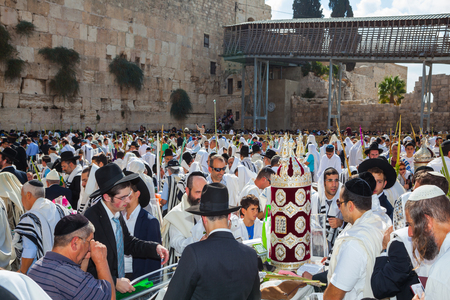
kavram © 123RF.com
How I love Your Torah! I meditate on it all day. Psalm 119:9
After weeks of examining our hearts and mourning our sin and spending time with God in our booths, we come to the end of High Holy Days—Simchat Torah. I had no idea (beyond what I’d read) what this service would be like. Simchat Torah is a Holy Day I had never heard of.
Lots of Christians talk about the Seven Feasts of Israel—Passover, First Fruits, Feast of Unleavened Bread, Pentecost, The New Year, Day of Atonement, and the Feast of Booths. Much is said about how the first four were prophesies fulfilled at Jesus’ first coming and the last three will be fulfilled in the last days. But what about Simchat Torah?
“For from the earliest times, Moshe has had in every city those who proclaim him, with his words being read in the synagogues every Shabbat.” Acts 15:21 Moshe’s (Moses’) words is Torah. For thousands of years, the walls of synagogues throughout the world have reverberated with the sounds of Genesis through Deuteronomy being read. Simchat Torah is the day when the last verses of Deuteronomy and the first verses of Genesis are read, signifying that the Torah of God never ends.
It’s the eighth Holy Day. It commemorates the Torah. Wait a minute, you might say. Isn’t that what Pentecost did? It did. But Pentecost (Shavuot) is commemorates the giving of the Torah. It’s observed by studying Torah. Simchat Torah is a celebration of what Torah is—what it says to us.
We’ve been given the Torah so we’d know what the standard for righteousness is. If the definition of sin is “missing the target,” what’s the target? Righteousness. How do we know what’s righteous and what isn’t? Torah!
Torah is righteousness written down. Yeshua (Jesus) is righteousness lived out. Jesus was sinless because He obeyed the Torah perfectly. (Some of the Jewish leaders at the time would have said they obeyed Torah perfectly too, but they didn’t even understand Torah accurately. Even if they were super-obedient, they couldn’t possibly obey something they didn’t completely understand. Jesus understood perfectly and He obeyed perfectly. That’s why He could die for our sins. Yeah…Yeah…bunny trail. But a really important bunny trail.)
If we’ve studied Torah (both the written down one and the living one—Jesus)… If we’ve made changes to the way we live by putting into practice the command of Torah (both written and living)… Then Simchat Torah is an expression of our gratitude for our growth and for our excitement at getting to grow more in righteousness.
After prayers of thanksgiving for the giving of the Torah, the Torah scrolls were brought out. Anyone who wanted to could carry a scroll for a processional through the room. It was a time of joyous dancing, clapping, and singing. Seven times the Torah scrolls processed around the perimeter of the room. Between each time, a reader read a prayer ending with a request for God to “answer us when we call.”
The service ended with another prayer and the rolling back the scroll to the beginning.
Since it was my first time, I didn’t actively participate. I didn’t sing, because I didn’t know the words. I didn’t dance because I’m an introvert. I just clapped and enjoyed.
Then I reflected.
Some might say these people were worshipping the Torah. Some would be wrong in saying that. Over and over in the Psalms, David says things like, “I love your Torah.” “Your commands are life to me.” And, as stated above, “I meditate on it all day.”
I thought about all that I’d seen and about Psalm 119. Do I love God’s commands? Are they life to me? Do I meditate on it all day?
Uh…not really.
But I want to, because “Those who love Your Torah have great peace; nothing makes them stumble.” Psalm 119:165.
This Shabbat, the reading will begin again with Genesis. “So trust comes from what is heard, and what is heard comes through a word proclaimed about the Messiah.” Romans 10:17 (CJB)
Thoughts? Let’s reason together in the comments.

